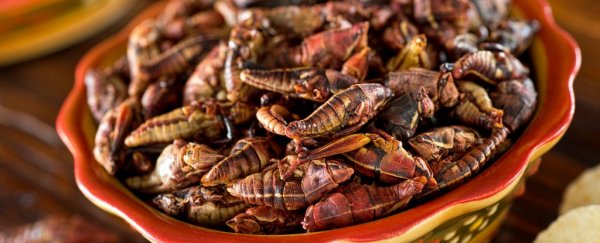If you want a healthy gut, crickets might just be the best thing for your menu. A new randomised, double-blind clinical crossover trial has found that munching on the protein-rich insects increases healthy gut bacteria - and may reduce inflammation in the body.
Many people feel totally squicked out by the idea of eating bugs, but a growing body of research suggests that it's the way of the future.
Global population continues to rise, and raising livestock is extremely hard on the environment, using tremendous land and water resources, and releasing vast amounts of methane into the atmosphere.
We know insects are a viable food source for humans, because, according to estimates at least, they make up part of the diet of at least 2 billion people around the world.
And research suggests that our bodies are actually really good at digesting them - not to mention they are nutritionally rich, packed with protein, vitamins, minerals and healthy fats.
"There is a lot of interest right now in edible insects," said nutritional scientist Valerie Stull of the University of Wisconsin-Madison Nelson Institute for Environmental Studies.
"It's gaining traction in Europe and in the US as a sustainable, environmentally friendly protein source compared to traditional livestock."
But insects also contain fibre, such as chitinous fibre in their exoskeletons, that is different from the dietary fibre in fruits, vegetables and grains.
Since dietary fibre promotes the growth of "good" bacteria, or probiotics, in the gut, what does insect fibre do to our microbiome, the complex and mysterious symbiotic microbes that live inside us? That's what Stull and her team set out to discover.
They recruited 20 healthy adults between the ages of 18 and 48. For two weeks, half of this group ate for breakfast a muffin or a shake including 25 grams of powdered crickets, while the other half ate the muffin or shake without crickets.
This was followed by a two-week period of normal, cricket-free eating to "reset" the body, and then the two groups switched. Neither the study participants, nor the researchers, knew which group was eating the crickets.
During the testing period, blood and stool samples were taken from the participants, and gastrointestinal questionnaires were filled out both prior to the clinical trial, and after each two-week cricket-eating period.
The blood was tested for a variety of health measures to assess liver function, as well as an enzyme associated with inflammation, and the stool was tested for changes in the microbiota, and inflammatory chemicals in the gastrointestinal tract.
None of the participants reported feeling any different on their questionnaires, and the researchers found no overall changes or side effects in either the gastrointestinal tract or overall microbial composition.
What they did find was an increase in a metabolic enzyme associated with gut health, and a drop in an inflammatory protein in blood plasma called TNF-alpha, which has been implicated in a range of ailments including cancer, major depression, Alzheimer's disease, and inflammatory bowel disease.
They also found a significant rise in a bacterium called Bifidobacterium animalis - on average, it increased 5.7-fold on a diet that included cricket flour. This bacterium is one of the good guys, having been implicated in a range of health benefits, including an increased immune response, and better gastrointestinal health and comfort.
Of course it's important to remember that the study is a small one, and further, larger studies will need to be undertaken to see if the results can be replicated. But it's looking pretty positive - and represents yet another potential benefit to eating bugs, among the many already posed.
"This very small study shows that this is something worth looking at in the future when promoting insects as a sustainable food source," Stull said.
Meanwhile, if you want to hoe into some fried locusts - and if you can find some - have at it!
The team's research has been published in the journal Scientific Reports.
